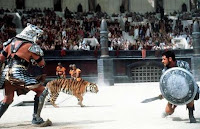Thursday, March 6, 2008
Tuesday, March 4, 2008
The Crusades

On September 11th 2001, a big tragedy happened that effected many people all over the world. The world trade center was crashed by a hijacked airplane. There were two other hijacked airplanes. One attempted to go into the White House and the other plane tried to hit the Pentagon. After the incident happened on September 11th, George W. Bush delivered a speech in which he said “This crusade, this war on terror is going to take a while.” Bush’s use of the word crusade worried and outraged people because a crusade is a time in history when holy wars were going on, which had nothing to do with a war on terrorism.
The crusades were a time in history when the Catholics and the Muslims had “Holy Wars” over the Holy land of Palestine where it was believed that Jesus was buried in. Comparing that to a war on terrorism has no similarities, which prove that he has no clue of Palestine which is where it was believed that Jesus was buried.
Tuesday, January 15, 2008

In Rome, leaders organized “shows” for people to watch and be entertained. Gladiators were put into the coliseum to either fight slaves, criminals, animals or Christians. They fought until someone died. People went to see these events for free to be distracted or just to have fun. These fights were violent and barbaric. Just as there are distractions in Rome, the United States today has many similar distractions, such as television, games, sports, ect. They were similar because we have shows about people killing each other and we watch sports hoping for someone to get hurt. I don’t think that the people are any different because when we see something on television we expect someone to get hurt. For example in a football game we expect to see someone get tackled.
Thursday, January 3, 2008
Macedonia was a kingdom north of Greece. King Phillip II was a king of ancient Greece and he conquered Macedonia. Later on he was sadly killed by one of his guards. When he died his son Alexander the Great took over. Alexander continued his father’s dream and conquered many other lands. He took over Persia, Egypt, and all he land of India. All of the cultures combined made a new culture called the Hellenistic culture.

This war was between the two city states Athens and Sparta. Athens had the stronger Navy and Sparta had the stronger army. Pericles’ strategy was to avoid land battles and attack by sea. Eventually Sparta reached the Athens territory. They destroyed everything even the food supply. They responded by bringing people into the city. On the second year of the war the Athens were struck. One third of the population was killed, including Pericles. The war went on for years in 421 B.C. the two sides signed a truce.
What was another effect that was caused by this war?
What was another effect that was caused by this war?
Friday, December 21, 2007

Philosophers
These wise men were once great people who were considered “lovers of wisdom.” They questioned the world around them. Three philosophers who were well known back in the Golden Age were, Socrates, Plato and Aristotle. Socrates encouraged Greeks to go farther, to question themselves and their mortal character. Plato was another great philosopher. He wrote a book called, “The Republic.” In the book he explained his vision for a perfectly governed city. Plato believed that all citizens should fall into different groups. Aristotle questioned the nature of the world and human thought, belief and knowledge. He also invented the scientific method.
-Chelsey Andeliz
These wise men were once great people who were considered “lovers of wisdom.” They questioned the world around them. Three philosophers who were well known back in the Golden Age were, Socrates, Plato and Aristotle. Socrates encouraged Greeks to go farther, to question themselves and their mortal character. Plato was another great philosopher. He wrote a book called, “The Republic.” In the book he explained his vision for a perfectly governed city. Plato believed that all citizens should fall into different groups. Aristotle questioned the nature of the world and human thought, belief and knowledge. He also invented the scientific method.
-Chelsey Andeliz
Thursday, December 13, 2007
Pericles Man of Gold
The Golden Age is a time of peace and prosperity. Usually new inventions and ideas were made and there are many achievements in art and architecture. The Golden Age in Greece took place from 461B.C. to 429B.C. Pericles ruled the during the Golden Age. This ruler had three specific policies that people had to live by. The first rule was to strengthen democracy. The second rule was to strengthen the Athenian Empire and the last rule was to glorify Athens.
Do you think the Golden Age was a bad or good time in history?
Subscribe to:
Posts (Atom)